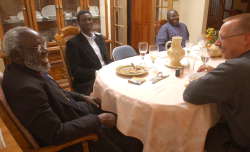Visiting bishop gives voice to suffering of Sudan

By JAY TOKASZ , BuffaloNews
BUFFALO, Nov 28, 2003 — In some parts of Sudan, clergy must mind what they say during services because government agents sit in the pews, listening for the slightest sign of insurgency. Children get one swig of water per day. Families walk for days to get to a church for worship.
Over the last two decades, the ravages of a civil war that seems to have no end caused millions of Sudanese to flee the country. Thousands resettled in the United States, including about 250 families in Western New York.
Many of these immigrants will reconnect with their struggling homeland a half-world away when, at 2 p.m. today, Bishop Paride Taban celebrates a special Mass for the local Sudanese community in Holy Cross Catholic Church at Maryland and Seventh streets.
Taban, bishop of the Diocese of Torit in Sudan, has been in Western New York since Monday as part of a diplomatic and spiritual tour of the United States that began Oct. 17 and will continue through next Thursday.
He hopes to call greater attention to the plight of the people of Sudan, the site of fighting since 1983 between animist and Christian rebels and the predominantly Arab and Muslim government.
The war has led to the deaths of more than a million people, many from an extensive famine brought on by the fighting. Millions more live in refugee camps. Human rights groups have reported widespread slavery, torture and attacks on civilians.
Taban, shepherd to more than 500,000 Catholics in Torit, is trying to persuade Americans that their government must lead a peace process in Africa’s largest country, by land area.
“We have to be the voice of the voiceless because many people cannot talk and somebody must talk on their behalf,” Taban said Thursday in an interview following a Thanksgiving Mass in St. Martin de Porres Catholic Church on Northampton Street. “We need to link our church in America with the church in Sudan.”
Taban, 67, has visited the United States on other occasions, but this is his first stop in Buffalo, and Thursday was his first celebration of an American Thanksgiving.
He joined the Rev. Ronald Sajdak, pastor of St. Martin de Porres, and several others for a traditional turkey dinner in the Clarence home of David and Mary Waters. He later celebrated with a Sudanese family in Buffalo.
“I thank God that Thanksgiving has found me here,” said Taban, who was ordained an auxiliary bishop in 1980 by Pope John Paul II. He was installed as the first bishop of Torit in 1983.
Sudanese immigrants in Buffalo are thrilled by his visit.
“It’s an honor to us. He remembered us, and where we have come from,” said Akol Madut, who moved here four years ago with his wife. The couple has four children.
Like most Sudanese, Taban has been personally affected by the fighting.
He was a prisoner for three months in 1989.
He spends much of his time in his diocese as a “nomadic bishop,” sleeping in his car and dodging fire as he reaches out to civilians who have little food, shelter or clean water.
In the past year, a cease-fire has quieted the fighting, but Taban says it is a fragile, temporary peace.
Taban believes the cease-fire came about only because the government has been unable to get enough weaponry since the United States attacked Iraq, one of the primary suppliers of arms to the Sudan army.
“I don’t like to say we approve war, but at least it has stopped the flow of arms (into Sudan),” he said. “It is a kind of blessing in disguise for us.”
In addition to lobbying the U.S government to become more involved in the peace process in Sudan, Taban has been talking with American bishops and pastors on his visit, urging them to support the country’s rebuilding efforts if and when a peace agreement is realized.
Tueday evening, he dined with Bishop Henry J. Mansell, he said.
Sajdak, Taban’s host during the visit, said the Sudanese bishop has a message from which many people can benefit – one that can put their own struggles in perspective.
“That’s so important for Americans to hear, because we sometimes take advantage of our freedoms and we think we have it tough when we don’t have hot water in the morning,” he said.
Listening to Taban was an opportunity to step back and understand how blessed most people living in the United States are, said David Waters.
“You develop an appreciation for all that people go through and all that our country represents, especially at a time of Thanksgiving,” he said.
